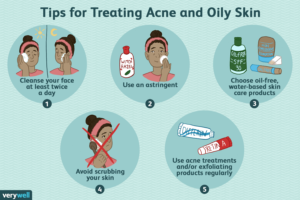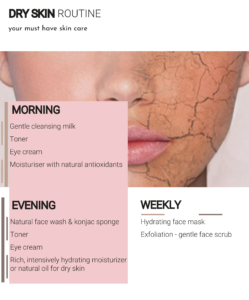To maintain oily skin, use a gentle cleanser to remove excess oil and follow with a toner and moisturizer to control oiliness and avoid dehydration. Additionally, regularly apply sunscreen and use blotting papers throughout the day to manage shine.
Oily skin can be caused by genetics, weather, stress, and hormones, while using harsh cleansers can increase oil production. By following a suitable skincare routine, individuals with oily skin can effectively manage and reduce excessive oil production for a healthier complexion.
Embracing appropriate skincare practices, such as specific cleansers, toners, and moisturizers, and incorporating sun protection, can help individuals gain control over their oily skin and maintain a balanced, healthy appearance.
Credit: www.quora.com
Understanding Oily Skin
Oily skin is a common skin type where the skin produces an excess amount of oil, known as sebum. This often results in a shiny complexion and can lead to clogged pores and acne breakouts. Understanding the causes and factors contributing to oily skin is essential in managing and maintaining a healthy skin balance.
Causes Of Oily Skin
Several factors contribute to the development of oily skin. Genetics, hormonal changes, and environmental factors play a significant role in the overproduction of sebum. Specifically, the sebaceous glands within the skin produce an excessive amount of oil, leading to oily skin. Additionally, certain medications and skincare products can exacerbate the condition, making it crucial to address these underlying causes.
Factors Contributing To Oily Skin
Various factors contribute to the development of oily skin, including:
- Genetics and hormonal changes
- Environmental factors
- Overactive sebaceous glands
- Medications and skincare products
Common Misconceptions about Maintain Oily Skin
When it comes to maintaining oily skin, there are several common misconceptions that can often lead to ineffective skincare routines. These misconceptions can prevent individuals from achieving the healthy, balanced complexion they desire. In this section, we will debunk two of the most prevalent misconceptions and provide evidence-based information to help you make informed decisions about your skincare regimen.
Avoidance Of Moisturizers
One common misconception among individuals with oily skin is the belief that moisturizers should be avoided. It is a myth that moisturizers will make your skin greasier and lead to clogged pores. In fact, moisturizers are essential for all skin types, including oily skin. The key is to choose the right type of moisturizer.
Contrary to popular belief, oily skin can still be dehydrated, which can trigger the overproduction of sebum. Sebum is the natural oil produced by our skin, and when the skin is dehydrated, it tries to compensate by producing even more oil. This can worsen the appearance of oily skin and can lead to breakouts.
By using a lightweight, oil-free moisturizer specifically formulated for oily skin, you can hydrate your skin without adding additional grease. Look for moisturizers that contain ingredients like hyaluronic acid or glycerin, which help attract and lock in moisture without clogging the pores. Applying a moisturizer twice daily, after cleansing your face, will help maintain the skin’s natural moisture barrier and prevent excessive oil production.
Impact Of Sunscreen On Oily Skin
Another misconception that individuals with oily skin often encounter is that sunscreen should be completely avoided. While it is true that some sunscreens can feel heavy or greasy on the skin, leading to a shiny appearance, it is essential to protect your skin from harmful UV rays.
Excessive sun exposure can not only cause sunburns and premature aging but can also worsen the appearance of oily skin. The sun’s rays can trigger the sebaceous glands to produce more oil, making your skin even oilier than before.
Fortunately, there are now sunscreens available specifically designed for oily skin. Look for oil-free or non-comedogenic formulas that are lightweight, easily absorbed, and provide broad-spectrum protection against UVA and UVB rays. These sunscreens are less likely to clog the pores and will not contribute to the greasy feeling often associated with oily skin.
By incorporating a sunscreen into your daily skincare routine, you can protect your skin from the sun’s harmful rays and prevent further damage without exacerbating your oily skin.
Effective Daily Routines
Effective Daily Routines play a crucial role in managing oily skin and maintaining a healthy complexion. By following a consistent and appropriate skincare regimen, individuals with oily skin can effectively manage excess oil production and achieve a balanced, clear appearance.
Cleansing Practices
Cleansing is the cornerstone of a daily routine for oily skin. Using a gentle, water-based cleanser twice a day can effectively remove excess oil, dirt, and impurities without stripping the skin’s natural moisture. This helps prevent clogged pores and reduces the risk of breakouts.
Importance Of Toning And Moisturizing
Toning is an essential step in oily skin care as it helps to balance the skin’s pH levels and tighten pores, reducing the production of excess oil. Following this, moisturizing is vital for all skin types, including oily skin. Opt for lightweight, non-comedogenic moisturizers to keep the skin hydrated without exacerbating oiliness.
Benefits Of Regular Sunscreen
Applying sunscreen daily is imperative for individuals with oily skin. It provides protection against harmful UV rays and prevents premature aging and skin damage. Look for oil-free, non-greasy formulations that won’t clog pores, offering broad-spectrum protection for complete skincare.
Natural Remedies
Oily skin can be frustrating to deal with, but there are natural remedies that can help you maintain a healthy balance. Instead of relying on harsh chemicals and synthetic products, consider incorporating these natural remedies into your skincare routine:
Face Wash With Warm Water
One of the simplest and most effective ways to manage oily skin is by washing your face with warm water. Warm water helps to open up your pores, allowing for a deeper cleanse and eliminating excess oil.
When washing your face, make sure to use a mild cleanser that is gentle on the skin. Avoid harsh cleansers that can strip away essential oils, as this can sometimes trigger your skin to produce even more oil.
Water-based Products And Diet
Another important factor in maintaining oily skin is the use of water-based products. Water-based products are lightweight and won’t clog your pores, reducing the risk of breakouts. Look for products that are labeled as “oil-free” or “non-comedogenic” to ensure that they won’t exacerbate your oily skin.
In addition to using water-based skincare products, it’s also important to pay attention to your diet. Avoiding greasy foods and trans fats can help reduce the production of excess oil. Instead, opt for a well-rounded diet filled with whole foods that are rich in vitamins and minerals.
Hydration And Moisturization
Contrary to popular belief, moisturizing is essential for oily skin. When your skin lacks moisture, it can stimulate oil production as a protective mechanism. To prevent this, choose a lightweight, oil-free moisturizer that won’t clog your pores.
Additionally, staying hydrated is crucial for maintaining healthy skin. Drinking an adequate amount of water throughout the day helps to flush out toxins and keeps your skin hydrated from the inside out. Aim for at least 8 glasses of water per day to support overall skin health.
Professional Advice
Consult a dermatologist for personalized advice on managing oily skin effectively.
- Wash your face twice daily with a gentle cleanser to remove excess oil.
- Use noncomedogenic products that are oil-free to prevent clogged pores.
- Avoid harsh scrubbing as it can stimulate more oil production.
- Avoid oil-based cleansers that can exacerbate oily skin.
- Avoid heavy moisturizers that may lead to a greasy appearance.
- Avoid harsh exfoliants that can strip your skin of natural oils.

Credit: www.sunmay.com
Lifestyle Changes
When it comes to managing oily skin, making certain lifestyle changes can have a significant impact on the overall health of your skin. By incorporating small adjustments into your daily routine, you can effectively control excess oil production and promote a clearer complexion. Here are some essential lifestyle changes to consider:
Impact Of Diet On Oily Skin
- Avoid greasy and fatty foods which can exacerbate oiliness
- Incorporate more fruits, vegetables, and whole grains into your diet
- Stay hydrated by drinking an adequate amount of water daily
Avoiding Face Touching
- Avoid touching your face throughout the day to prevent transferring excess oils
- Use clean hands or tools when applying skincare products
- Consider using blotting papers for quick oil absorption
Managing Stress Levels
Stress can trigger excess oil production in the skin, leading to breakouts and dullness. To manage stress effectively:
- Practice relaxation techniques such as deep breathing or meditation
- Engage in regular physical activity to reduce stress levels
- Ensure an adequate amount of sleep each night to allow for skin regeneration
Community Insights
Discover effective strategies for managing oily skin with community insights. Learn about gentle cleansing, toning, moisturizing, wearing sunscreen, and incorporating blotting papers into your skincare routine. Embrace natural methods like water-based products, dietary adjustments, and proper hydration to control oily skin and avoid irritation.
Reddit Users’ Tips For Oily Skin
Reddit is a treasure trove of valuable insights, and when it comes to managing oily skin, the Reddit community has some invaluable tips to share. Users recommend opting for water-based products and gentle foaming face wash. They stress the importance of avoiding greasy foods and trans fats in the diet and highlight the significance of staying hydrated. Additionally, they advocate for using oil-free and noncomedogenic skincare products to tackle excess oiliness effectively.
Advice On Anti-aging For Oily Skin
When it comes to anti-aging, individuals with oily skin often seek advice on managing both oiliness and signs of aging. The community suggests incorporating face acids into the skincare routine to combat excessive oil and maintain youthful-looking skin. They also emphasize the importance of addressing sebum plugs and stress the significance of a suitable skincare routine to effectively manage oily skin while also targeting anti-aging concerns.
Innovative Solutions
When it comes to maintaining oily skin, finding effective solutions can be challenging. However, thanks to innovative advancements in skincare, there are now more options available than ever before. In this article, we will explore some of the latest technologies and techniques that can help improve your skincare routine and manage oily skin.
Improving Skincare Routine
An effective skincare routine plays a crucial role in managing oily skin. Here are a few tips to enhance your daily regimen:
- Start by using a gentle cleanser to remove excess oil and impurities from your skin. Look for oil-free and non-comedogenic products to prevent clogged pores.
- Toners can be a valuable addition to your routine as they help balance the skin’s pH levels and control oil production. Opt for alcohol-free toners to prevent drying out your skin.
- Contrary to popular belief, moisturizers are essential for oily skin too. Choose lightweight, oil-free moisturizers specially formulated for oily skin to keep it hydrated without adding greasiness.
- Don’t forget to protect your skin from the harmful effects of the sun. Look for oil-free and non-comedogenic sunscreen with a broad-spectrum SPF of 30 or higher.
- Blotting papers can be your best friend throughout the day to remove excess oil without disrupting your makeup. Keep a pack handy for quick touch-ups whenever needed.
Technological Advancements For Oily Skin
Besides improving your skincare routine, technological advancements have brought some innovative solutions specifically designed for oily skin. These advancements include:
- Face Acids: Products containing ingredients like salicylic acid, glycolic acid, and lactic acid can help exfoliate your skin, unclog pores, and control oil production.
- Sebum Plugs: Innovative devices such as sebum plugs can be used to extract excess sebum and minimize the appearance of enlarged pores. These tools offer a non-invasive and efficient solution for managing oily skin.
By incorporating these innovative solutions and staying consistent with your skincare routine, you can effectively manage oily skin and enjoy a healthier complexion.

Credit: www.amazon.com
Frequently Asked Questions
How Can I Stop My Skin From Being So Oily?
To control oily skin, use a gentle cleanser, toner, moisturizer, sunscreen, and blotting papers daily. Avoid harsh products and stay hydrated.
How Can I Control Oily Skin Naturally?
To control oily skin naturally, wash face with warm water twice a day, use water-based products, eat a well-rounded diet, and hydrate. Avoid touching face and apply a light moisturizer. Also, choose oil-free, non-comedogenic products and wear sunscreen. Include blotting papers in your routine for on-the-go oil control.
What Is The Best Routine For Oily Skin?
For oily skin, use a gentle cleanser, toner, moisturizer, sunscreen, and blotting papers in your routine. Wash face twice daily, avoid greasy foods, hydrate, use water-based products, and apply moisturizer. Avoid aggressive cleansers triggering increased oil production. Choose oil-free, noncomedogenic products.
Wash face daily, use gentle face wash, and wear sunscreen.
Why Is My Face So Oily All The Time?
Oily skin can be caused by genetics, weather, stress, and hormones. Using a gentle cleanser, toner, moisturizer, sunscreen, and blotting papers can help control excess oil. Avoid harsh cleansers and make dietary changes like avoiding greasy foods. Stay hydrated and avoid touching your face.
Conclusion
Effectively managing oily skin requires a consistent routine of gentle cleansing, toning, moisturizing, and sun protection. Additionally, making dietary and hydration adjustments is beneficial. Avoiding harsh and aggressive products and seeking oil-free, noncomedogenic alternatives is essential in maintaining a balanced complexion.
Lastly, proper skin care and understanding the underlying causes contribute to successfully managing oily skin.




